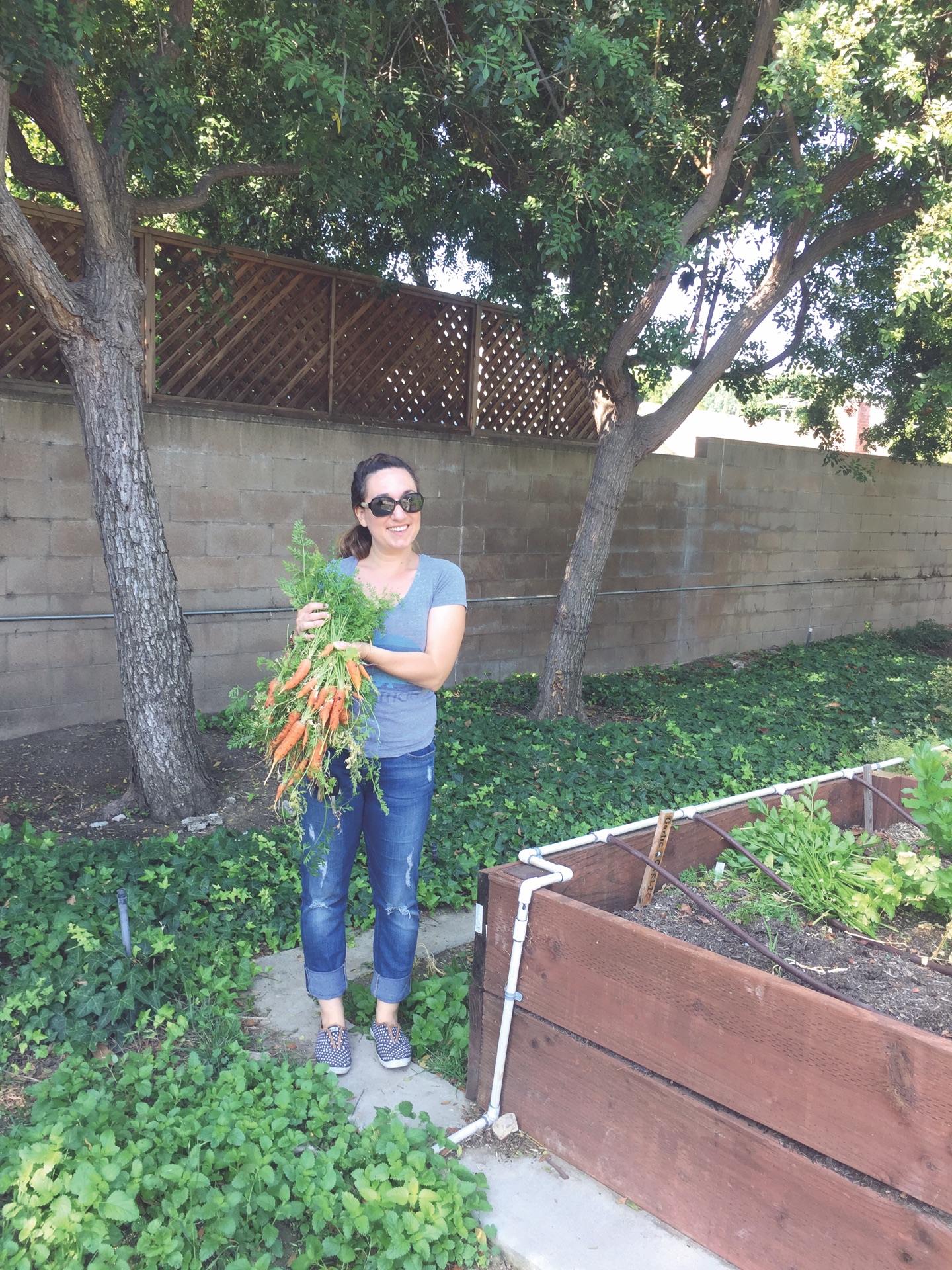 Becca Bodenstein
Becca Bodenstein At de Toledo High School in West Hills, the garden includes four raised growing beds, fruit trees, a toolshed and a new greenhouse that’s growing spirulina — a superfood — in partnership with a Tel Aviv high school. De Toledo has a recycling program and a composting program, and for Sukkot its students repurposed old soccer goalposts to fashion sukkah walls. All of the aforementioned are part of de Toledo’s commitment to sustainability and increased environmental awareness, said Becca Bodenstein, the school’s 12th grade dean and teacher of Judaism and the Environment. She’s been helming these efforts since 2007, when she joined the staff of the school’s previous iteration — the New Community Jewish High School, or “New Jew.”
“When man was put on Earth, we were given the power to rule it and the responsibility to care for and protect it,” Bodenstein said. “Everything we do addresses our responsibility toward sustainability, from the food to the compost to the recycling to the amazing experiential and academic programming.”
One example of that programming is the new Camp Eco-Botics for middle school students, which includes ecology (growing, harvesting and cooking food) and robotics. The Ecobots — as the program’s students/campers are known — built a scarecrow and planter boxes and visited the Shalom Institute’s honey farm to learn about bees’ role in the environment.
Bodenstein believes in hands-on experiential education and in connecting learning to current events. “The garden component — growing, touching, tasting, smelling and appreciating it — cultivates hard work and patience,” she said, “but our newspapers are talking about environmental issues every day.” The recent drought and the wildfires in California, she noted, are part of the state’s evolving environmental picture.
The experiential approach works. Former student Michal Anna Chetrit remembers her “Judaism and the Environment” experience at New Jew, taking care of the plants and lemon trees, and learning from Bodenstein how to connect her Jewish heritage to her responsibility to the earth. Bodenstein taught Chetrit and her peers Jewish concepts such as bal tash’hit (prohibition against wasting food/ resources), za’ar ba’aley chaim (not causing animals unnecessary suffering), pikuach nefesh (saving a life), tzedek (acts of righteousness) and environmental justice, and aspects of tikkun olam (fixing a broken world).
A personal or communal journey toward increased environmental awareness, conservation and sustainability starts with giving up or reducing use of plastic.
Now 22, Chetrit is a senior at the University of Arizona, studying the environment and Judaic studies and volunteering at an organic farm. “I’m implementing Jewish lessons from the class into my life,” she said, identifying the concept of bal tash’hit as a guiding principle, which she expands to include “also not wasting energy or time.” After graduating, she hopes to help the Jewish community of Tucson reconnect with its agrarian roots.
This kind of environmental program and its student impact are more than many schools, synagogues and community organizations have to offer, but Bodenstein sees them as only the beginning.
“The earth needs positive environmental leadership now more than ever,” she said. “It’s our responsibility as educators in all contexts. We need leadership to teach, build up a new generation of kids who can fix all the problems that we have.”
As an example, Bodenstein pointed to Netiya, a Los Angeles organization that works with faith-based communities, using their land not just to alleviate food insecurity “but teaching people about the delicacy of the earth that we live on. Synagogues and schools are the perfect places to do that learning.”
A personal or communal journey toward increased environmental awareness, conservation and sustainability starts with giving up or reducing use of plastic and finding the best recycling program for your school or institution, she said. But she also believes in the power of community to make a difference, identifying networks — including the ROI Community of Jewish Innovators, Jewish environmental organizations Mazon and Netiya, and Camps Alonim and JCA Shalom — that “shaped my education perspective and ability to have endurance and hope.”
“Find the network of people who are with you in this battle,” Bodenstein said. “You have to have hope, keep moving forward, educating and inspiring. You have to replant. You have to tend the garden. You can’t stop or nothing is going to grow. There is so much work to be done and everyone needs to dig in and do their part.”























 More news and opinions than at a Shabbat dinner, right in your inbox.
More news and opinions than at a Shabbat dinner, right in your inbox.